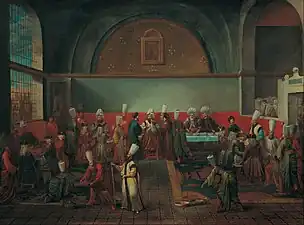Daniel Harvey (diplomat)
Sir Daniel Harvey (10 November 1631 – August 1672) was an English merchant and diplomat who was the English Ambassador to the Ottoman Empire from 1668 to 1672.
Life
Harvey was born in Croydon on 10 November 1631, the first surviving son of Daniel and Elizabeth Harvey. His grandfather Thomas was a wealthy merchant and former Mayor of Folkestone who had nine children, the eldest of which was the anatomist William Harvey.[1]
Harvey was educated at Pembroke College, Oxford and Caius College, Cambridge, graduating in 1647;[lower-alpha 1][2] Like his father, he was a member of the Turkey or Levant Company whose main source of profits was the lucrative trade in dried currants.[lower-alpha 2] In 1651, he married Elizabeth, daughter of Edward Montagu, Baron Montagu of Boughton and shortly afterwards purchased an estate at Coombe, Surrey.
Career

The Harveys were Royalist sympathisers during the Wars of the Three Kingdoms while the Montagus had been prominent supporters of Parliament. This made Daniel's marriage to Elizabeth an important connection and in 1654 he was made Sheriff of Surrey.[3] The Montagus were also closely involved in the negotiations leading to the 1660 Restoration of Charles II.[4] Harvey was elected Member of Parliament for Surrey in the Convention Parliament, knighted in May 1660 and appointed custodian of Richmond Park.[2] Most importantly, Charles renewed the Levant Company's monopolistic charter in 1661.

Harvey's wife Elizabeth was a significant figure in her own right and a renowned society hostess; she was a close friend of Charles' mistress Lady Castlemaine who stayed with her in 1667 during her quarrel with Charles, although they later fell out. One suggestion is Harvey's appointment as Ambassador to the Ottoman Empire was to remove an inconvenient husband.[5]
The Levant Company charter of 1585 required it to maintain an agent in Constantinople, which looked after English trading privileges within the Ottoman Empire. Since the expenses associated with the Embassy were so high and increasingly covered more than just commercial dealings, the position of 'Agent' was later converted into Ambassador, normally held by a Levant Company member.[6] Harvey was appointed in January 1668 and arrived in December accompanied by his secretary the playwright George Etherege. His predecessor was Heneage Finch, 3rd Earl of Winchilsea; Harvey's sister Elizabeth was married to his cousin Heneage Finch, Earl of Nottingham.
Harvey died in Constantinople on 26 August 1672 at the age of 40 and was later buried at Hempstead, Essex.[2]
Family
Daniel and Elizabeth had four children;
- Edward Harvey (30 March 1658 - 24 October 1736); Tory or Jacobite MP, arrested in 1722 for his role in the Atterbury Plot but released without charge;
- Lt-General Daniel Harvey (1664 – 6 September 1732); soldier and Whig MP who was Governor of Guernsey from 1714 to 1732;
- Edward Harvey (died young);
- Elizabeth Harvey; her marriage to Thomas Grey, 2nd Earl of Stamford ended in divorce amid accusations of adultery;
His sisters also married well-connected and influential husbands;
- Elizabeth Harvey (c. 1627 - 15 March 1676); married Heneage Finch, 1st Earl of Nottingham;
- Mary Harvey (September 1629 - 7 February 1704; married Sir Edward Dering, 3rd Baronet and a composer in her own right;
- Sarah Harvey (c. 1636 - 18 June 1715); married Richard Bulkeley, 3rd Viscount Bulkeley.
Footnotes
- Oxford became the Royalist capital during the First English Civil War 1642-46, which may explain the transfer to Cambridge.
- Its full title being 'The Governor & Company of Merchants of England trading into the Levant Seas.'
References
- Sakula, Alex (1980). "The Betchworth Portraits; Members of the Family of William Harvey". Medical History. 24 (3): 333–341. doi:10.1017/S0025727300040357. PMC 1082658. PMID 6997657.
- "Harvey, Daniel (HRVY646D)". A Cambridge Alumni Database. University of Cambridge.
- "HARVEY, Daniel (1631-72), of Coombe, Surr". History of Parliament Online. Retrieved 11 April 2012.
- Dewar, David, Funnel. Warwick (2016). The Pursuit of Accountability: A History of the National Audit Office. OUP Oxford. p. 44. ISBN 978-0198790310. Retrieved 15 March 2018.
- Jordan, Dan, Walsh, Michael (2016). The King's Bed: Sex, Power and the Court of Charles II. Abacus. p. 161. ISBN 978-1408704905.
{{cite book}}: CS1 maint: multiple names: authors list (link) - Devecka, Martin. The Levant Company Between Trade and Politics (PDF). University of Warwick. Retrieved 15 March 2018.